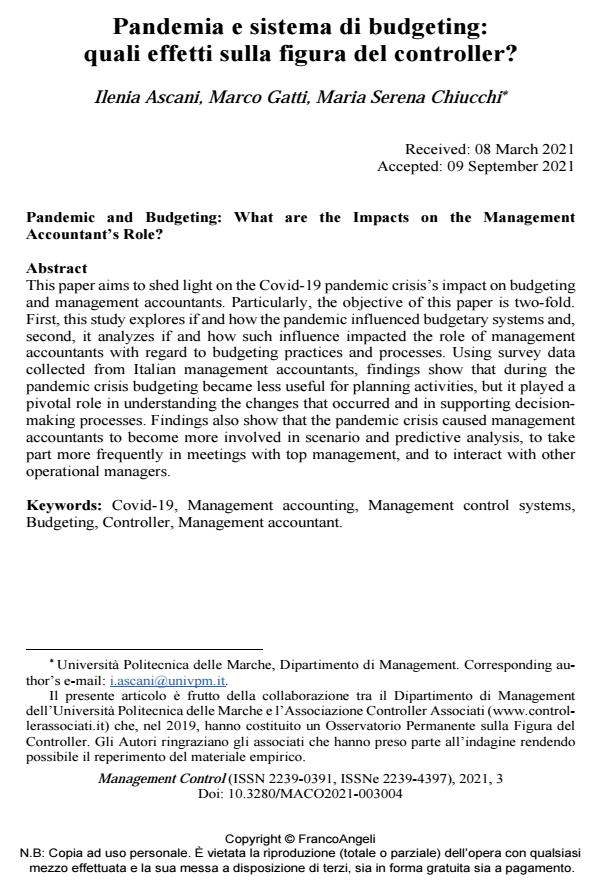Pandemic and Budgeting: What are the Impacts on the Management Accountant’s Role?
Journal title MANAGEMENT CONTROL
Author/s Ilenia Ascani, Marco Gatti, Maria Serena Chiucchi
Publishing Year 2021 Issue 2021/3
Language Italian Pages 22 P. 65-86 File size 235 KB
DOI 10.3280/MACO2021-003004
DOI is like a bar code for intellectual property: to have more infomation
click here
Below, you can see the article first page
If you want to buy this article in PDF format, you can do it, following the instructions to buy download credits

FrancoAngeli is member of Publishers International Linking Association, Inc (PILA), a not-for-profit association which run the CrossRef service enabling links to and from online scholarly content.
This paper aims to shed light on the Covid-19 pandemic crisis’s impact on budgeting and management accountants. Particularly, the objective of this paper is two-fold. First, this study explores if and how the pandemic influenced budgetary systems and, second, it analyzes if and how such influence impacted the role of management accountants with regard to budgeting practices and processes. Using survey data collected from Italian management accountants, findings show that during the pandemic crisis budgeting became less useful for planning activities, but it played a pivotal role in understanding the changes that occurred and in supporting decision-making processes. Findings also show that the pandemic crisis caused management accountants to become more involved in scenario and predictive analysis, to take part more frequently in meetings with top management, and to interact with other operational managers.
Keywords: Covid-19, Management accounting, Management control systems, Budgeting, Controller, Management accountant.
- La prospettiva della performatività e gli strumenti di misurazione e gestione della performance Lino Cinquini, Silvana Revellino, Maria Serena Chiucchi, in MANAGEMENT CONTROL 3/2024 pp.5
DOI: 10.3280/MACO2023-003001 - Le dimensioni della conoscenza aziendale. Profili di investigazione tra crisi pandemica ed economia digitale Rosa Lombardi, in MANAGEMENT CONTROL 3/2021 pp.5
DOI: 10.3280/MACO2021-003001 - I "pacchetti" di controllo manageriale nei team virtuali Guido Noto, Carmelo Marisca, Gustavo Barresi, in MANAGEMENT CONTROL 3/2024 pp.43
DOI: 10.3280/MACO2023-003003 - Gli effetti della pandemia da COVID-19 sulla disclosure aziendale. Un'analisi empirica nella prospettiva dell'Integrated Reporting Filippo Vitolla, Vitiana L’Abate, Nicola Raimo, Arcangelo Marrone, in MANAGEMENT CONTROL 1/2024 pp.155
DOI: 10.3280/MACO2024-001008 - Controllo di gestione e relazioni intraorganizzative: la prospettiva del controller Oppi Chiara, Vagnoni Emidia, Cattaneo Cristiana, Galizzi Giovanna, in MANAGEMENT CONTROL 3/2024 pp.155
DOI: 10.3280/MACO2024-003008 - Looking through the kaleidoscope: exploring literature on management accountants using the becoming, doing, relating and making sense perspectives Ilenia Ascani, Marco Gatti, Maria Serena Chiucchi, in Qualitative Research in Accounting & Management /2026 pp.27
DOI: 10.1108/QRAM-02-2024-0044
Ilenia Ascani, Marco Gatti, Maria Serena Chiucchi, Pandemia e sistema di budgeting: quali effetti sulla figura del controller? in "MANAGEMENT CONTROL" 3/2021, pp 65-86, DOI: 10.3280/MACO2021-003004